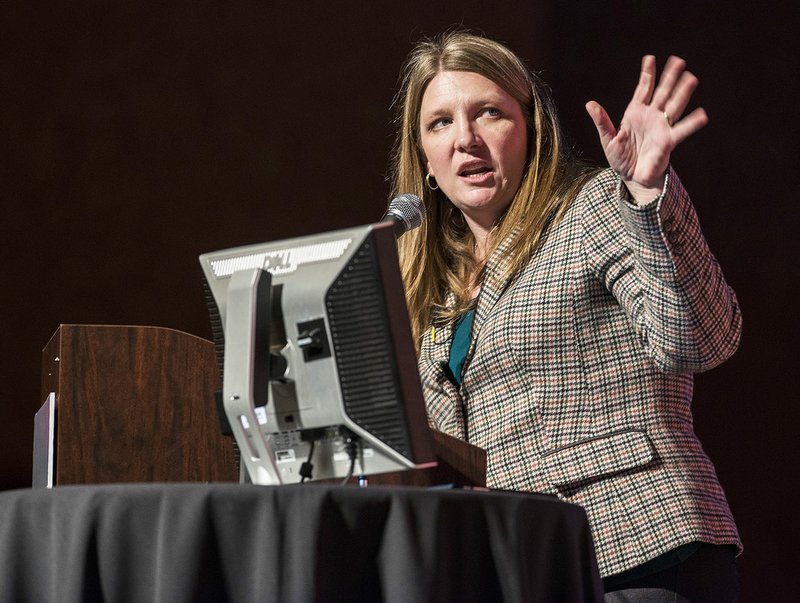LOWELL -- Northwest Arkansas stands out among its peer metropolitan areas with fast job growth and relatively low housing prices, but continues to struggle with lower incomes and other concerns, according to a University of Arkansas report released Friday.
The sixth annual State of the Northwest Arkansas Region from the university's Center for Business and Economic Research shows the area has done well largely thanks to a few big employers and should help smaller players get in the economic game, said Kathy Deck, the center's director. She delivered the report to a crowd of around 200 bank and real estate representatives, civic leaders and others at the Northwest Arkansas Board of Realtors office.
State of the Northwest Arkansas Region 2015
The most recent report from the University of Arkansas compared the Fayetteville-Springdale-Rogers metropolitan area to several peer cities, measuring change from 2014 to 2015.
RegionGross domestic product growthEmployment growthUnemploymentBusiness establishment growthMedian household incomePoverty rates
Northwest Arkansas4.4%4.9%3.8%2.8%$50,78814.3%
Raleigh, N.C.7%3.8%4.8%3.9%$65,77811.6%
Durham-Chapel Hill, N.C.0.2%2.1%5%3.3%$54,16015.9%
Madison, Wis.3.4%2.1%3.4%4.5%$64,17410.8%
Des Moines, Iowa2%0.7%3.5%2.1%$62,02410.7%
Austin, Texas5%4.6%3.4%6%$67,19511.7%
Source: Center for Business and Economic Research, University of Arkansas
Deck focused on the metropolitan area's growth in businesses: Northwest Arkansas saw 2.8 percent more businesses get off the ground in 2015, according to federal data. That's significantly higher than the country and state as a whole, but well behind the 6 percent growth in the Austin, Texas, area, and lower than three of the other four metropolitan areas used for comparison.
"We know we can't count on our big businesses to stay big businesses forever" as technology and markets inexorably change, Deck said. "If we really have our eye on the prize for economic prosperity in the future, I think this is the clarion call to arms."
The peer metropolitan areas include Des Moines, Iowa, and Madison, Wis., and were chosen because they're vibrant regions with research universities, much like Northwest Arkansas, but also give goal posts for improvement, Deck said.
She pointed to entrepreneurship programs at the university and Northwest Arkansas Community College and groups such as Fayetteville's Startup Junkie Consulting, which helps guide potential entrepreneurs at no cost, as good steps toward helping the area's small businesses. More groups should join in the effort, she said.
Average airfare remains higher than most peers and the national average, topping $500 a ticket. Deck called that figure very concerning for companies needing lots of travel.
The Northwest Arkansas Regional Airport offers flights to 14 destinations, including some with the low-cost carrier Allegiant, but that airline's flights are focused on leisure trips, airport CEO Scott Van Laningham said. He and other business and civic leaders are working on getting another low-cost carrier for daily and business trips.
"You never know till it's a done deal, but we think we are making some progress," he said. "The big challenge is we are competing with lots of other airports our size."
The report had a few brighter spots, with uncommonly low unemployment and 4.9 percent growth in the number of people employed last year, outshining the country, state and all five peers. Northwest Arkansas added about 50,000 jobs in five years, Deck said.
Owning a house is also relatively cheap in the area compared to those regions. The median home last year cost less than one-sixth of income, meaning half of all homeowners spent that proportion of their income or less on their home, according to the report.
"We have strength to rest on," Deck said.
Northwest Arkansas continues to lag in terms of poverty and income, according to the report. About 14 percent of residents are in poverty, lower than just a few years ago and much lower than the state, but also about 3 percent higher than most of the peer regions. The difference translates to thousands of people here. Median income last year was just under $51,000, growing about one-fourth as quickly as the country's.
The relatively low income stems partly from low workforce participation -- many adults who could work aren't doing so, Deck said.
"This, in a place where we're desperate for workforce," she added, alluding to unemployment that has dipped below 3 percent in the metropolitan area.
The people who aren't working are mostly women, particularly those with children 6 years old or younger, Deck said. Census data shows 85 percent of the area's men were working in 2014, and 69 percent of women joined them. Only 62 percent of women with young children worked. The numbers were essentially unchanged since 2009.
"It seems that we need to look very closely at our early childhood education," Deck said. "These things obviously all work together."
Several school districts and other organizations throughout the area offer Pre-K education at low or no cost for low-income families. Rogers Public Schools offers services for more than 400 four-year-olds at school or at home, for example, and Springdale accommodates about 1,300 kids between three and five. Those programs' directors say they're essentially full every year.
"We're swamped at spring enrollment," said Cathy Davis, the Rogers director. Parents will get in line at 3 a.m. to sign up their child for the following August, she said, with the father often trading places with the mother later in the morning to go to work.
"The moms tell me they need to work, but they've got little ones at home and they want to make sure their needs are met," Davis said.
Pre-K offers many parents the chance to earn more income, said Darlene Fleeman, the Springdale director.
"A lot of our parents will get their children in quality Pre-K, and they say, 'OK, now I'll get a job,'" she said. "We do have a lot of mommas that work."
NW News on 10/01/2016

